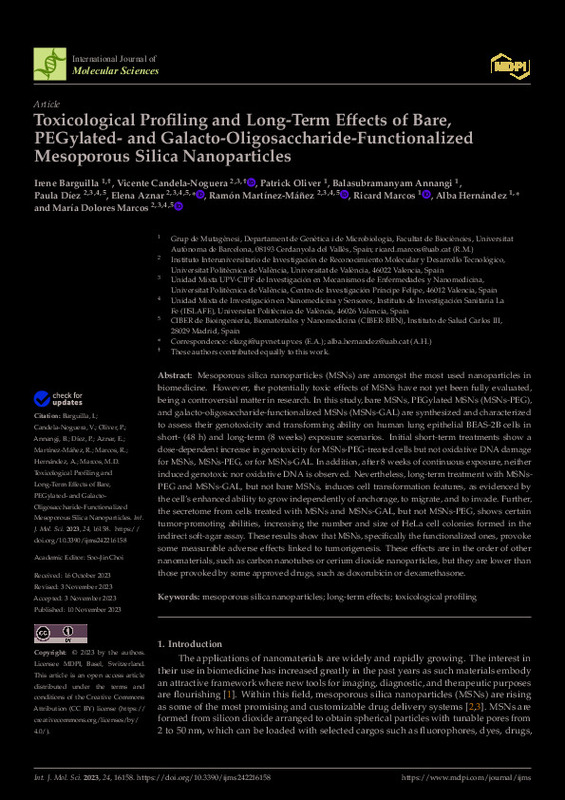|
Resumen:
|
[EN] Mesoporous silica nanoparticles (MSNs) are amongst the most used nanoparticles in
biomedicine. However, the potentially toxic effects of MSNs have not yet been fully evaluated,
being a controversial matter in research. ...[+]
[EN] Mesoporous silica nanoparticles (MSNs) are amongst the most used nanoparticles in
biomedicine. However, the potentially toxic effects of MSNs have not yet been fully evaluated,
being a controversial matter in research. In this study, bare MSNs, PEGylated MSNs (MSNs-PEG),
and galacto-oligosaccharide-functionalized MSNs (MSNs-GAL) are synthesized and characterized
to assess their genotoxicity and transforming ability on human lung epithelial BEAS-2B cells in
short- (48 h) and long-term (8 weeks) exposure scenarios. Initial short-term treatments show a
dose-dependent increase in genotoxicity for MSNs-PEG-treated cells but not oxidative DNA damage
for MSNs, MSNs-PEG, or for MSNs-GAL. In addition, after 8 weeks of continuous exposure, neither
induced genotoxic nor oxidative DNA is observed. Nevertheless, long-term treatment with MSNsPEG and MSNs-GAL, but not bare MSNs, induces cell transformation features, as evidenced by
the cell¿s enhanced ability to grow independently of anchorage, to migrate, and to invade. Further,
the secretome from cells treated with MSNs and MSNs-GAL, but not MSNs-PEG, shows certain
tumor-promoting abilities, increasing the number and size of HeLa cell colonies formed in the
indirect soft-agar assay. These results show that MSNs, specifically the functionalized ones, provoke
some measurable adverse effects linked to tumorigenesis. These effects are in the order of other
nanomaterials, such as carbon nanotubes or cerium dioxide nanoparticles, but they are lower than
those provoked by some approved drugs, such as doxorubicin or dexamethasone.
[-]
|
|
Código del Proyecto:
|
info:eu-repo/grantAgreement/AEI/Plan Estatal de Investigación Científica y Técnica y de Innovación 2017-2020/PID2020-116789RB-C43/ES/DESARROLLO DE NAMS PARA LA EVALUACION DE LOS EFECTOS PARA LA SALUD DE CONTAMINANTES EMERGENTES PRESENTES EN LAS AGUAS RESIDUALES/
...[+]
info:eu-repo/grantAgreement/AEI/Plan Estatal de Investigación Científica y Técnica y de Innovación 2017-2020/PID2020-116789RB-C43/ES/DESARROLLO DE NAMS PARA LA EVALUACION DE LOS EFECTOS PARA LA SALUD DE CONTAMINANTES EMERGENTES PRESENTES EN LAS AGUAS RESIDUALES/
info:eu-repo/grantAgreement/EC/H2020/965196/EU
info:eu-repo/grantAgreement/MECD//FPU15%2F02753/ES/FPU15%2F02753/
info:eu-repo/grantAgreement/AEI//PID2021-126304OB-C41//NUEVOS MATERIALES, SONDAS Y SISTEMAS ELECTRÓNICOS PARA LA DETECCIÓN DE DROGAS Y APLICACIONES BIOMÉDICAS/
info:eu-repo/grantAgreement/AEI//PID2021-128141OB-C22//DESARROLLO DE NUEVOS MATERIALES INTELIGENTES Y SU APLICACIÓN COMO SISTEMAS ANTIVIRALES, ANTIBIOFILM, ANTIENZIMÁTICOS Y ANTIMICROBIANOS PARA LA INDUSTRIA ALIMENTARIA/
info:eu-repo/grantAgreement/GVA//CIPROM%2F2021%2F007//ADVANCED MOLECULAR PROBES, SENSORS AND NANOPARTICLES FOR CONTROLLED RELEASE APPLICATIONS/
info:eu-repo/grantAgreement/GVA//MFA%2F2022%2F049//Nuevos materiales guiados por estímulos para la lucha contra el cáncer/
info:eu-repo/grantAgreement/EC/H2020/965196/ES/Innovative tools to study the impact and mode of action of micro and nanoplastics on human health: towards a knowledge base for risk assessment/PLASTICHEAL
info:eu-repo/grantAgreement/GC//2021-SGR-00731/
info:eu-repo/grantAgreement/GVA//APOSTD%2F2020%2F153/
info:eu-repo/grantAgreement/ISCIII//CB06%2F01%2F2012//CIBER-BBN /
info:eu-repo/grantAgreement/MCIU// PID2020- 116789RB-C43/
info:eu-repo/grantAgreement/ESF//CD20%2F00120/
[-]
|
|
Agradecimientos:
|
This work was supported by PID2021-126304OB-C41, PID2021-128141OB-C22, and PID2020-116789RB-C43 funded by MCIN/AEI/10.13039/501100011033/, by the European Regional Development Fund "A way of doing Europe", by Generalitat ...[+]
This work was supported by PID2021-126304OB-C41, PID2021-128141OB-C22, and PID2020-116789RB-C43 funded by MCIN/AEI/10.13039/501100011033/, by the European Regional Development Fund "A way of doing Europe", by Generalitat Valenciana (CIPROM/2021/007), and by the Generalitat de Catalunya (2021-SGR-00731). The work was also supported by CIBER "Consorcio Centro de Investigación Biomédica en Red" (CB06/01/2012), Instituto de Salud Carlos III, Ministerio de Ciencia e Innovación. This study forms part of the Advanced Materials programme (MFA/2022/049) and was supported by MCIN with funding from European Union NextGenerationEU (PRTR-C17.I1) and from Generalitat Valenciana. This project has also received funding from the European Union's Horizon 2020 Research and Innovation Programme under Grant Agreement No. 965196. Alba Hernández was granted an ICREA ACADEMIA award.
Vicente Candela-Noguera thanks the Spanish Government for his fellowship (FPU15/02753). Paula Díez thanks the Generalitat Valenciana for her contract APOSTD/2020/153 and thanks the Instituto de Salud Carlos III and the European Social Fund for the financial support `Sara Borrell¿, CD20/00120. The authors thank the Electron Microscopy Service at UPV for support.
[-]
|









